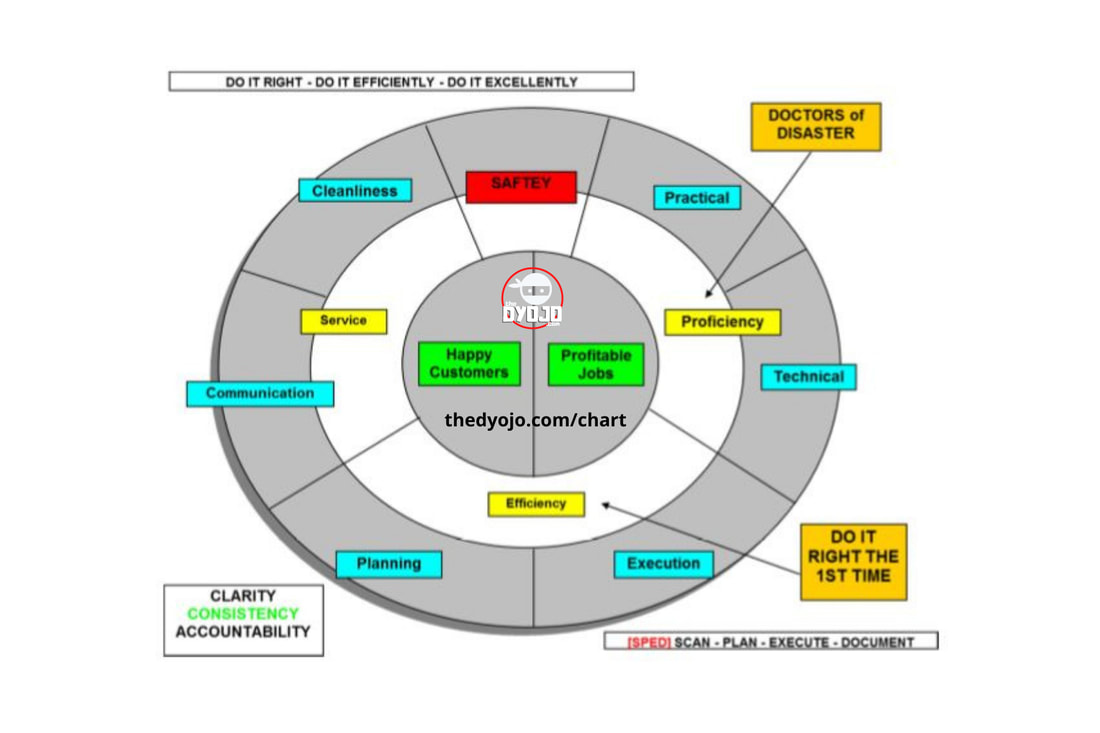|
I share a story in my latest book about being hired to elevate training for an established office and then being berated for doing what I thought I was hired for; training. The experience of working in an environment with a supervisor that didn’t do much to help their team members with career development was a challenge but I want everyone reading to understand that it can be done. Career development in property restoration, as in most of the skilled trades, will require you to develop the right mindset and habits in customer service. We will address two key components of customer service in this article, communication and cleanliness.
Property restoration career development: Create your own opportunities It may surprise some of those reading to learn that prior to 2008 we had specialists for almost everything. When I started in the industry in 2002, with the team in bright yellow, we had separate divisions. There was some crossover assisting teams when they needed help, but our primary functions and teams were distinct from each other. We had managers for each of our divisions, mold, water, fire/contents, repairs, and carpets. When I arrived with the company listed in the opening paragraph, my role as production manager was expected to oversee all of the “divisions” similar to those listed above. As a side note, we offered trauma/crime scene cleanup but it was not a service we did a lot of. I saw bio-services as an opportunity to learn more about the process and market those services so that I could create a growth void that I could then fill. You may be starting over, like I was, or feel like you are stuck in career limbo, look for something that no one else wants to do and create your own opening. Whatever level you are at in your career, life is about opportunity, not convenience. Property restoration career development: Training for customer service While I was not aware of the title at the time, I had to develop a process for teaching my team soft skills in addition to the technical (hard) skills of property restoration. If you are a manager and/or owner, when you train your team members to develop their mindset and habits, you communicate opportunities for growth which will also push you to continue to grow. This quote attributed to Richard Branson, is a strong encouragement to any organization that wants to thrive with their people, "Train people well enough so they can leave, treat them well enough so they don't want to." The chart below is the result of years of grinding out a process for addressing what I felt was important when training a diverse group of team members who had to master multiple service offerings. If you are committed to training, you have to budget time to focus on core principles and supplement scheduled training with on the job follow up by yourself and your team members. You don’t have accountability until you create clarity, develop consistency, and your team is committed to holding each other to the shared standards (culture). Accountability starts with the people in positions of leadership leading by example, without which it won’t exist. Customer service, or better said, the customer experience, is essential to long term success in a service based industry like property restoration. You cannot expect that customer service is common sense or that your existing team will pass down everything that you hold dear. Two key aspects of customer service that you have a direct impact on are:
Property restoration career development: Cleanliness is godliness Cleanliness is godliness in property restoration. What is the first thing you should do when you meet a client, regardless of the time of day? If you are entering a home, you should be asking, “Would you like me to take my shoes off,” or slipping on protective booties that your company supplies you boxes and boxes of. Why is this important? Because it demonstrates to the homeowner that you respect their home, you respect them, and your number one priority is their experience during this process. What is the alternative? You may walk in and the customer may be fine, but making this consideration known is key to setting yourself apart - even if no one else in your company does it. Obviously, if the whole house is flooded, you aren’t taking your shoes off and booties are useless. You can say, “Normally we would take our shoes off but it does not appear to be safe at this time.” One component of sales is ensuring you communicate how you and your company are different, not by putting your competitors down but by showing your client your unique values and habits. Additional habits that demonstrate a standard of cleanliness:
I can remember early on, I was on a project where I had forgotten my vacuum cleaner (or someone had borrowed it and not returned it), and the day was wrapping up. Somehow the only tool I had was a hand broom and dust pan. My boss had made it clear that sweeping at the end of every day was important to him and would pay off with the customer. So, I swept my way out on my hands and knees. This wasn’t a detailed sweep as we were coming back to complete more demolition the next day, but that action won a lot of favor with the customer. Unfortunately, not every customer will vocalize their satisfaction, but your habits are critical as they establish your way of doing things. Property restoration career development: Communication Communication is more than just talking. If you are the one presenting the information, your integrity is essential. Unfortunately, there are too many examples of people who will speak when without thinking about what they are saying or about things that they don’t fully understand. You are not doing yourself or your client a good service if you tell them something just to ease the tension or sound important. Whenever we would onboard new technicians, or in peak season when we would bring in temporary labor, I would give some variation of a speech about two great communication anathemas that weren’t to be practiced in our team culture:
Property restoration career development: Be intentional What is a business? In order to have a sustainable property restoration business you will need two things: happy customers and profitable jobs. Too many organizations, and people in a position of leadership, focus on profits as though they are the cause and not the effect. This is not to diminish how important profits are, but to understand that it is much more effective to direct your team members to focus on what they can control. All team members play a role in achieving happy customers and this is where we should focus our training. If you teach your team how to produce happy customers, you will find ways as a team to achieve profitability. On the other hand, if you always preach profits first, you will struggle to achieve happy customers. One is a cause, the other is an effect. Al Erisman, author of The ServiceMaster Story, discussed how early leaders in this flagship restoration organization had the mindset that profits were the subject but not the object of their efforts. As you develop your career in property restoration, use these three guides:
Being an intentional restorer starts with doing it right. Whatever your roles and responsibilities are, learn how to do them right. Once you have this foundation you can learn to perform these functions more efficiently. This does not mean faster. Yet, efficiency increases overall team speed without cutting corners or sacrificing quality (doing it right). In everything we do, we want to add that sizzle which stamps your work with your way (reflects your culture). When you arrive with booties, lay down flooring protection, set dust control barriers, and close every day with sweeping the worksite, you are showing your customer that you have a way; that you have pride in what you do (excellence).
1 Comment
5/13/2024 07:42:16 pm
I really enjoyed your blog posts, thank you.
Reply
Leave a Reply. |
Words
The DYOJO - helping contractors shorten Archives
June 2024
Categories
All
EstimatingMarketingInsurance ClaimsLeadership |
|
| |||||||


 RSS Feed
RSS Feed
